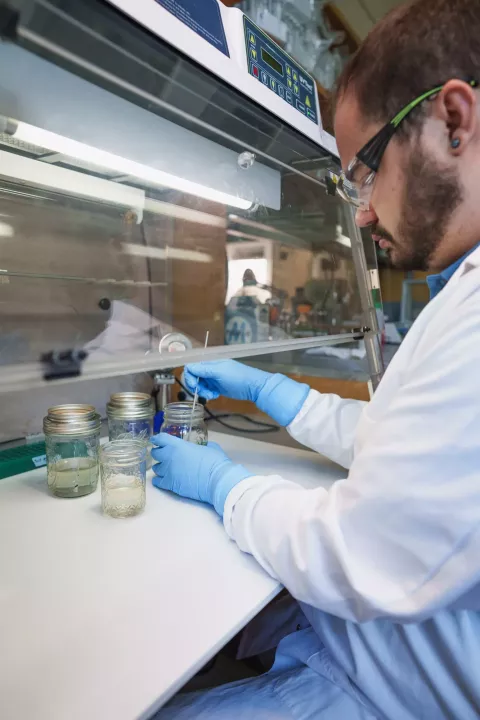
Matthew Farbaniec is a genetics major from Mount Laurel, New Jersey. Matthew has been working in Assistant Professor Anna O’Brien’s lab.
COLSA: Tell us about your research in as non-technical language as possible.
Matthew Farbaniec: I’ve been researching the use of duckweed as green manure. Over the summer, I conducted experiments to test the effectiveness of different duckweed genotypes and their associated microbe lines as fertilizers. The study focused on how these combinations impact the growth of both the duckweed itself and lettuce when used as green manure. Additionally, I started developing a related project to investigate how heavy metal accumulation in green manures might affect plant growth.
COLSA: What challenge does your research seek to address?
Matthew: This research seeks to combat the current use of chemical fertilizers. The use of duckweed green manure can lower the runoff of phosphorus, nitrogen and other chemicals into local lakes, rivers and bodies of water. It also seeks to address a possible improvement to crop growth from use of the green manure over chemical fertilizers.

COLSA: Your work elevates research supported by the NH Agricultural Experiment Station. How will it benefit people, communities and/or the natural environment in New Hampshire?
Matthew: Stormwater runoff that includes chemical fertilizers can cause a variety of harmful environmental effects, including algal blooms, in lakes and ponds. The use of a green manure could lower the harmful nutrients in stormwater runoff and prevent these harmful blooms and other events that end up harming the natural environment. The use of a green manure is also beneficial for local New Hampshire farmers because it provides a cleaner and longer-lasting source of nutrients for their crops and can promote better growth.
COLSA: What are you learning as a result of you experience?
Matthew: I have learned so much from this experience. I have learned more about research development through helping Alyssa with the first portion of the project while also developing a project of my own focusing on heavy metal accumulation in green manures. I also have gained many research skills that will be useful throughout my academic and professional career.
COLSA: What do you love most about UNH?
Matthew: I love how devoted UNH is to not only research but undergraduate research. The university really wants to get students involved in their fields and highlight the amazing things students do in their research.
The NH Agricultural Experiment Station helps improve New Hampshire's lives, livelihoods and landscapes through research and discoveries that sustain agricultural, food and forested ecosystems and supporting the development of future scientists. The Station research described above is based on work with joint funding from the USDA National Institute of Food and Agriculture under Hatch award number 7005040 and the state of New Hampshire.